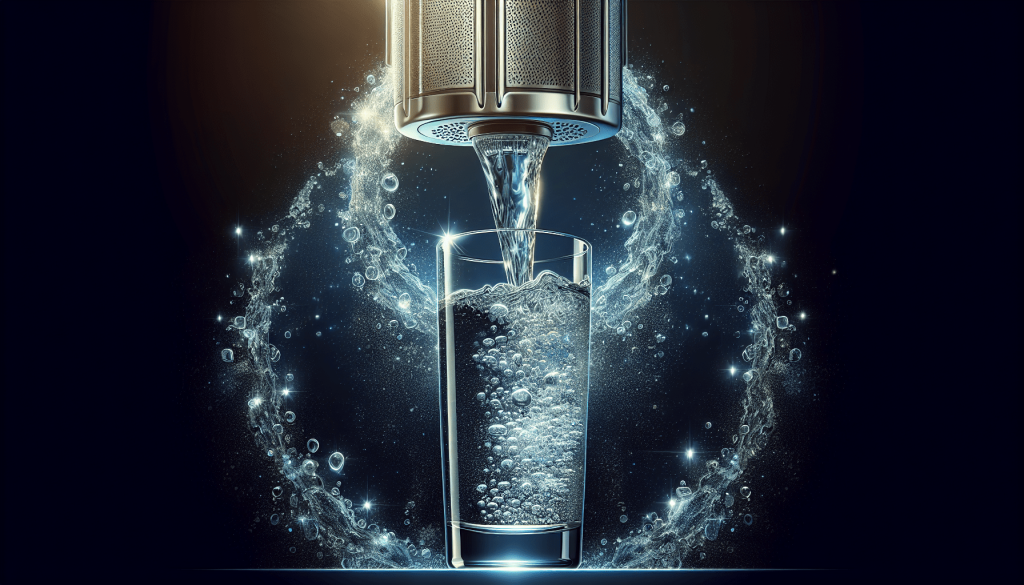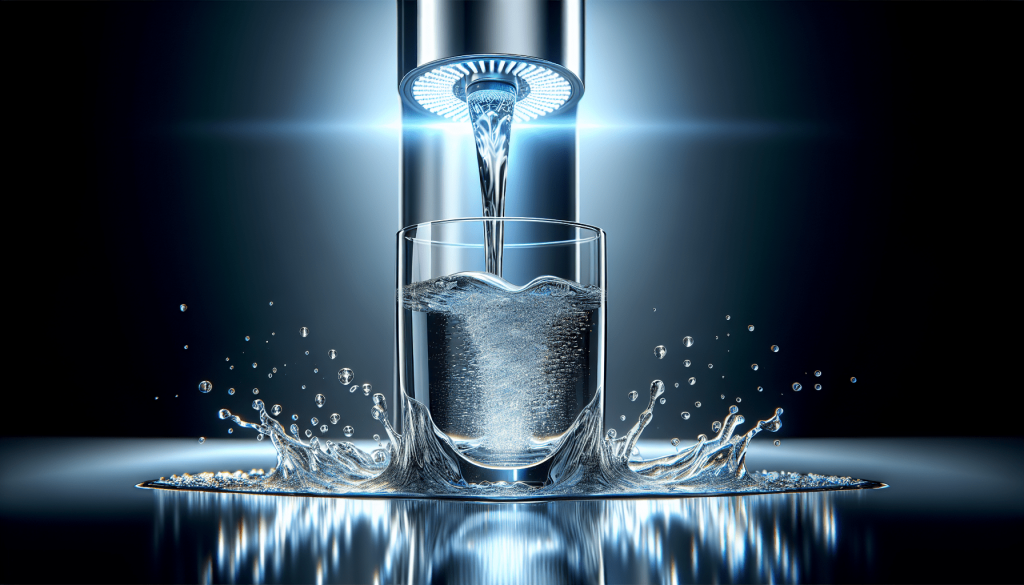You’re probably aware of the importance of clean drinking water for your health, but with so many options available, you might wonder, “Do home water filters really work?” This article aims to shed light on the effectiveness of home water filters in improving the quality of your tap water. We’ll explore different types of filters, the contaminants they can remove, and the benefits of using them. So, let’s get straight to the facts and discover how home water filters can potentially transform the way you consume water.

Different Types of Home Water Filters
Activated Carbon Filters
Activated carbon filters are one of the most common types of home water filters. These filters use a porous material, typically made from coconut shells or similar carbon-rich sources, to adsorb impurities from the water. The activated carbon has a large surface area, allowing it to effectively trap contaminants and improve the taste and odor of the water.
Reverse Osmosis Filters
Reverse osmosis filters are highly effective at removing a wide range of contaminants from water. They work by forcing water through a semipermeable membrane that only allows water molecules to pass through, effectively filtering out most impurities such as heavy metals, pesticides, bacteria, and viruses. Reverse osmosis filters are capable of producing purified water, but they may also remove beneficial minerals.
Ceramic Filters
Ceramic filters are a popular choice for home water filtration systems. These filters are made from ceramic material with tiny pores that can trap sediment, bacteria, and other impurities. Ceramic filters are often used in conjunction with other filtration technologies to provide comprehensive water purification.
Ultraviolet Filters
Ultraviolet filters use UV light to disinfect water and kill bacteria and viruses. These filters are particularly effective for treating microbiologically contaminated water, providing an additional layer of protection against harmful microorganisms. However, UV filters do not remove other impurities, so they are often used in combination with other filtration methods.
How Home Water Filters Work
Mechanical Filtration
Mechanical filtration is the process of physically removing larger particles and sediment from the water. This is achieved through the use of various filter media, such as activated carbon, ceramic, or a mesh screen. Mechanical filtration is the first line of defense in most water filters and helps to prolong the lifespan of the other filter components.
Chemical Filtration
Chemical filtration involves the use of filter media that can adsorb or react with specific contaminants in the water. Activated carbon is a common filter media used for chemical filtration, as it can effectively remove chlorine, chloramines, and certain organic compounds. Other chemical filter media, such as ion exchange resins, may be used to remove heavy metals or other specific contaminants.
Biological Filtration
Biological filtration is the process of removing bacteria, viruses, and other microorganisms from the water. This is typically achieved through the use of ultraviolet filters or by incorporating antimicrobial agents into the filter media. Biological filtration helps to ensure that the water is free from harmful pathogens and safe for consumption.
Benefits of Using Home Water Filters
Removal of Contaminants
One of the primary benefits of using home water filters is the removal of various contaminants from the water. Depending on the type of filter, contaminants such as sediments, chlorine, heavy metals, pesticides, herbicides, bacteria, and viruses can be effectively filtered out. This improves the overall quality and safety of the water for drinking, cooking, and other household uses.
Improved Taste and Odor
Home water filters can greatly improve the taste and odor of tap water. Filters like activated carbon filters are particularly effective at reducing the presence of chlorine and other chemicals that can give water an unpleasant taste or smell. By removing these impurities, home water filters enhance the overall quality of the water and make it more enjoyable to consume.
Convenience and Cost Savings
Using a home water filter eliminates the need to constantly purchase bottled water or rely solely on tap water. With a water filter in place, you have a constant supply of clean and filtered water right from your tap. This not only saves you money in the long run but also reduces the environmental impact of plastic waste from bottled beverages. Home water filters provide convenience and peace of mind, knowing that you have access to clean water whenever you need it.
The Effectiveness of Home Water Filters
Certifications and Standards
Certifications and standards play a crucial role in determining the effectiveness of home water filters. Look for filters that have been certified by reputable organizations such as NSF International or the Water Quality Association. These certifications ensure that the filters meet specific performance criteria and are capable of effectively removing contaminants.
Performance Testing
Manufacturers of home water filters conduct performance testing to evaluate the filter’s effectiveness in removing contaminants. Testing involves subjecting the filter to various contaminants and measuring its ability to remove them. Look for filters that have undergone rigorous testing and can provide documented evidence of their performance.
Filter Replacement and Maintenance
The effectiveness of home water filters can also depend on proper filter replacement and maintenance. Most filters have a specified lifespan based on usage and water quality. Regularly replacing filters and following proper maintenance procedures will ensure that the filter continues to work effectively. Neglecting filter replacement and maintenance can result in reduced efficiency and compromised water quality.

Contaminants Filtered by Home Water Filters
Sediments
Home water filters are designed to trap sediments such as sand, silt, and rust particles. These particles can make water appear cloudy or affect its taste and odor.
Chlorine and Chloramines
Chlorine and chloramines are commonly used disinfectants in water treatment plants. Home water filters can effectively remove these chemicals, improving the taste and odor of the water.
Heavy Metals
Home water filters equipped with specific filter media, such as activated carbon or ion exchange resins, can effectively remove heavy metals like lead, mercury, and copper from the water.
Pesticides and Herbicides
Many home water filters are capable of removing certain pesticides and herbicides. Carbon filters are particularly effective at reducing these chemical contaminants.
Bacteria and Viruses
Ultraviolet filters are highly effective at killing bacteria and viruses, providing an additional layer of protection against waterborne pathogens. Some ceramic filters also have antimicrobial properties that can inhibit the growth of bacteria.
Limitations of Home Water Filters
Inability to Filter Some Contaminants
While home water filters are effective at removing many contaminants, they may not be able to eliminate all types of impurities. Some filters may have limitations in filtering certain organic compounds, nitrates, fluoride, or specific bacteria and viruses. It is essential to understand the capabilities and limitations of the chosen filter to ensure it meets your specific water filtration needs.
Limited Lifespan of Filters
Home water filters have a limited lifespan, and their effectiveness diminishes as the filters become saturated with contaminants. Depending on usage and water quality, filters may need to be replaced every few months or years. Regular filter replacement is crucial to maintaining the filter’s efficiency and ensuring clean drinking water.
Effectiveness Depends on Proper Installation and Maintenance
The effectiveness of a home water filter depends on proper installation and maintenance. Filters need to be properly installed, with all connections secure and water flowing through the filter as intended. Regular maintenance, including filter replacement and cleaning, is essential for optimal performance. Failure to maintain the filter can result in reduced filtration effectiveness and compromised water quality.

Factors to Consider when Choosing a Home Water Filter
Water Quality
The quality of your water is an essential factor to consider when choosing a home water filter. Conduct a water quality test or obtain a water quality report from your water provider to identify the specific contaminants present in your water. This information will help you select a filter that can effectively remove those contaminants.
Filter Performance and Lifespan
Consider the performance and lifespan of the filter before making a purchase. Look for filters that have been tested and certified for the removal of specific contaminants present in your water. Additionally, consider the filter’s lifespan and the availability and cost of replacement filters.
Budget
Set a budget for your home water filter purchase. Filters vary in price, depending on their features and capabilities. Consider the initial cost of purchasing the filter as well as the ongoing costs of replacement filters and maintenance.
Installation and Maintenance Requirements
Evaluate the installation and maintenance requirements of the filter to ensure they align with your capabilities and lifestyle. Some filters may require professional installation, while others can be easily installed by homeowners. Consider the frequency and ease of filter replacement to ensure it fits your maintenance routine.
Common Misconceptions about Home Water Filters
All Filters are Created Equal
One common misconception is that all home water filters are created equal. In reality, there are significant differences in the quality, effectiveness, and capabilities of different filters. It is essential to choose a filter that meets your specific needs and has been tested and certified for its performance.
Boiling Water is Sufficient
Boiling water is often seen as a simple and effective way to purify water. While boiling can kill bacteria and viruses, it does not remove other contaminants such as heavy metals, chemicals, or sediments. Home water filters provide a more comprehensive solution for water purification.
Bottled Water is Always Better
Many people believe that bottled water is superior to tap water or filtered water. However, bottled water is not subject to the same regulatory standards as tap water and may contain similar or even higher levels of contaminants. Additionally, bottled water is costly and contributes to plastic waste. Using a home water filter allows you to have clean, filtered water conveniently available without the environmental impact.
Filters Remove Beneficial Minerals
Another misconception is that home water filters remove beneficial minerals from the water, resulting in demineralized water. While some filtration methods like reverse osmosis may remove minerals, many home water filters do not remove essential minerals. These minerals can still be obtained from other dietary sources, and the overall improvement in water quality outweighs the minimal loss of minerals.

Case Studies and Research on Home Water Filters
Effectiveness in Removing Contaminants
Numerous studies have been conducted to evaluate the effectiveness of home water filters in removing contaminants. These studies have consistently shown that properly maintained filters can significantly reduce the presence of sediments, chlorine, heavy metals, pesticides, herbicides, bacteria, and viruses in drinking water.
Impact on Health and Well-being
Research has also investigated the impact of using home water filters on health and well-being. Studies have shown that using a home water filter can reduce the risk of gastrointestinal illnesses and other waterborne diseases. Additionally, improved taste and odor of filtered water encourage increased water consumption, leading to better hydration and overall well-being.
Comparison with other Water Treatment Methods
Comparative studies have been conducted to evaluate the efficacy and cost-effectiveness of home water filters compared to other water treatment methods such as boiling, chlorine disinfection, or bottled water. These studies consistently demonstrate that home water filters provide a more comprehensive and convenient solution for purifying drinking water, often at a lower cost compared to alternative methods.
Conclusion
Home water filters are an effective and convenient way to improve the quality and safety of your drinking water. With various types of filters available, you can choose the one that best suits your needs and addresses the specific contaminants present in your water. Remember to consider factors such as water quality, filter performance, budget, and installation and maintenance requirements when choosing a home water filter. By using a home water filter, you can enjoy clean, filtered water right from your tap and make a positive impact on your health, well-being, and the environment.



